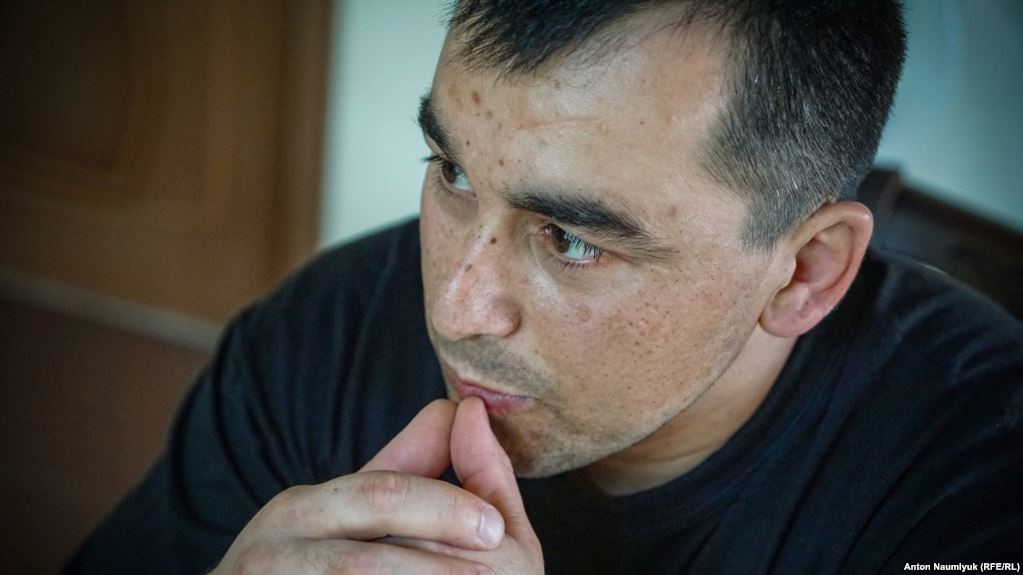Russia forced to withdraw trumped-up charge against Crimean Tatar activist

In what is almost a first for Russian-occupied Crimea, one of the criminal charges against Crimean Tatar activist, Ismail Ramazanov has been dropped “for want of a crime”. There was a crime, of course, but under Russian occupation, the chances of getting proceedings initiated against the enforcement officers who planted ammunition on the young man are next to nil.
Ramazanov’s lawyer, Alexei Ladin, had already succeeded in getting Ramazanov released from custody after six months. This was in compliance with legislation, but that has been ignored in very many political cases in occupied Crimea, and was an achievement. So too was getting the charges sent back for ‘re-investigation’, and now dropped.
The possession of ammunition charge under Article 222 § 1 of Russia’s criminal code was brought after officers supposedly found 24 bullets during a search of Ramazanov’s home. Ladin explains that the ‘investigators’ had decided that there was no proof that they had belonged to Ramazanov. The young Crimean Tatar is a devout Muslim and it was unthinkable that he would be holding weapons.
This was the face-saving option, since a ballistic expert assessment had found that the ammunition had been produced at a Ukrainian factory. Ladin believes that the bullets had probably been in the possession of the Ukrainian Security Service and then ended up with the Russian FSB.
The lack of any evidence and incriminating details about the origin of the ammunition did not prevent the FSB from getting Volodymyr Balukh a first politically-motivated prison sentence. On that occasion, however, there were no other charges, and the FSB clearly had no intention of giving up its reprisals against the Ukrainian activist who had refused to remove the Ukrainian flag from his home.
Ramazanov is one of at least three Ukrainians who have faced two charges with the second, involving planted ammunition or hashish, clearly seen as less important, and probably added to justify remanding the person in custody.
The other charge, under Russia’s notorious ‘extremism’ legislation, against Ramazanov has not been withdrawn.
Ramazanov was arrested on 23 January 2018 after armed men in balaclavas turned up at the family home in the village of Novy Mir. After claiming to have found a Makarov pistol and bullets, they took him away.
He was next seen the following day in court. He had very obviously been beaten and was in so much pain that he could not stand during the detention hearing. He told ‘judge’ Iryna Kirillova from the Simferopol District Court that he had been beaten by the FSB officers both during the search, and later in their vehicle, and said that one of the four masked men who brought him into the court had been among those beating him. Kirillova ignored this and remanded him in custody for two months, with this later extended twice. As well as the ammunition, he was accused of making ‘extremist’ remarks on the Zello Internet radio program with this supposed ‘inciting enmity towards Russians’. The charges are under Article 282 § 1 of Russia’s criminal code, on inciting enmity or denigrating a group on ethnic grounds or their belonging to a social group. In this case, the occupation regime is calling ‘Russians’ a social group.
It takes strength and courage to remain firm when several officers are beating you or using other forms of torture to try to extract a ‘confession’. Ramazanov held out then, and has ever since.
While in custody, he told the Crimean ‘High Court’ that the charges against him were “provocation against him and the entire Crimean Tatar people”. He went on to say:
“The charges of inciting inter-ethnic enmity are unthinkable. In my circle of friends there are many Russians. Hearing these charges, they don’t understand what is going on these days in Crimea. It’s become common now for people to hear that somebody’s Crimean Tatar, Muslim and say that this means they’re an extremist or terrorist. That is what is happening now in Crimea and I can’t understand it. In more than 20 years as part of Ukraine, such issues never arose. Nobody saw any terrorists and there weren’t any. I don’t know who this suits now. God’s judgement will explain it all, and I will use all possible legal means to try to defend myself against this provocation directed against me, my people, my faith.”.
Ramazanov spent much of his time in detention thinking about other political prisoners, like Oleg Sentsov, and passing on pictures and messages of support.
After being released on 14 July, he lodged a formal complaint accusing Dmitry Kosyakin, an investigator from the Russian Investigative Committee of falsifying the evidence in his case. This pertained to a court hearing where a protocol was presented which claimed that Ramazanov had been read all the file material aloud with this supposedly taking three hours. Kosyakin claimed that Ramazanov had refused to sign the protocol. In fact, Ramazanov had been held in his cell on the day in question (26 June), was not presented with anything and had therefore had nothing to refuse to sign.
Ladin had long pointed to gross irregularities in this case and it is cheering that he has forced the Investigative Committee to acknowledge some. The most overtly political charge of ‘extremism’ remains and, indeed, in September Ramazanov was one of five Crimean Ukrainians added to Russia’s huge ‘List of Terrorists and Extremists’
The presumption of innocence is just one of very many components of a real justice system that the occupier’s people clearly do not view as applying to them.





